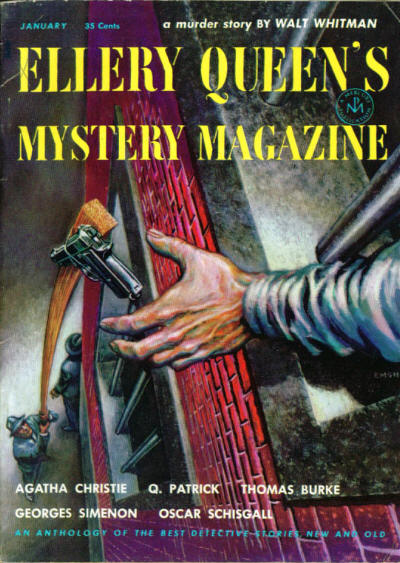By H. B. Hickey (real name: Herbert B. Livingston, 1916-87).
First appearance: Fantastic Adventures, April 1951.
Parental caution: Strong language.
Short story (14 pages).
Online HERE.
"What's a girl to do when she's being followed — especially when she hasn't the least idea she has something the guy wants bad enough to kill for?"For Kylie Kenton, an asteroid prospector and our first person narrator, it all starts with what seems to be an innocent question:
. . . "I hear you might be going on to Earth. Care to take a passenger?"Kenton knows better than to say no to the commander of the Space Patrol:
. . . As long as I was stuck, I might as well be stuck properly. I took Shirley Crando to the Interplan Club, which has a clear-view roof and a head waiter with X-ray eyes. He saw right straight through my bankbook. . . .Besides, Shirley does have her finer points:
. . . A girl with a calendar-picture shape, a face like a valentine, and a blonde, page-boy bob that swirled perfume in my nostrils. And a very nice girl. . . .It comes as a shock, however, when Shirley tells Kenton about her involvement with Harry Dillon—the late Harry Dillon, a murdered colleague of his—and their plans to marry:
". . . when I got here [to Mars], Harry was dying in a hospital room, and I took one look at him and knew I'd never really loved him. But I said I did anyway, because it was the only thing to do at such a time." . . .Then out of nowhere a couple of thugs attempt a kidnapping:
. . . He ran right into my fist and then there were two of them down. And I was running like crazy, with the whole Club going in shouts and screams, and Shirley holding onto me. . . .In the scuffle someone dies, and Kenton is now a wanted man ("on the lam, like a cheap crook") hightailing it for the Asteroid Belt, in a quiet moment musing in typical hard-boiled fashion:
. . . Women and trouble may not be necessarily connected, but the probability tends toward certainty. . . .Now, though, with enough time to think, he connects the dots between Harry Dillon's murder and the kidnap attempt; it all boils down to . . .
. . . "Something about solid thorium, nothing but thorium, pure thorium, whole damn planetoid of thorium." . . . It was the biggest thing that had ever happened . . . It could mean interplanetary war. Or, used properly, it could be of tremen-dous benefit. . . .But to make a getaway he'll need some help—only . . .
. . . His body was lying just inside. And it wasn't pretty. He had been worked over before they'd killed him. . . .It all looks hopeless, but Shirley knows a lot more than she realizes . . .
Resources:
- H. B. Hickey wrote in several genres, including Westerns and SF; go HERE for a couple of autobiographical sketches.
- See HERE for his FictionMags listing and HERE for bibliographical data at the ISFDb.
- For all of its credible technobabble, the story does stumble over several scientific mistakes, which many of you should be able to find.
 |
| We THINK this is our author, but we're not sure. |
Category: Life and death down these mean spaceways
















































